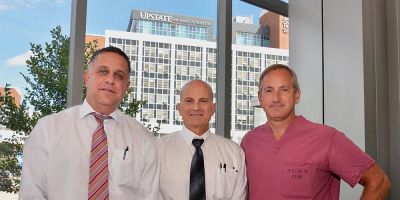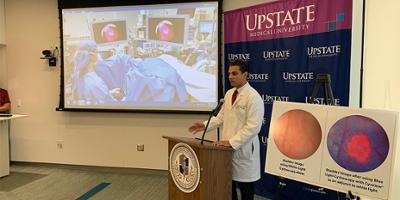College of Nursing awarded $666K grant for more skilled nurse practitioners to stem opioid crisis
The U.S. Department of Health and Human Services has awarded Upstate Medical University’s College of Nursing a multi-year grant to support increasing the number of skilled nurse practitioners to address the opioid crisis.
The three-year grant in the amount of $666,036 will support: the creation of a new supplemental curriculum to train psychiatric mental health nurse practitioner students – a graduate level program in the College of Nursing – on how to treat patients with opioid and substance abuse disorders; and monetary stipends to the students who pursue the training. The grant will also support a part-time Project Success Specialist position to work with partners and students in the program.
A multidisciplinary team will develop the curriculum this fall. The additional training, which will consist of classroom and clinical hours, will amount to a micro-credential – a focused skill set that can be included on a transcript. The program’s micro-credential status will help it live on beyond the three-year grant, said Melissa Carr, director of clinical placement at the College of Nursing.
In 2020, FPMHNP students at the College of Nursing will be eligible to apply for the program, which includes a stipend. During the three-year period, the grant will support stipends in the amounts of: $28,352 to five doctoral students and $10,000 to the equivalent of 26 master’s level students.
Many students in the FPMHNP program work full time while pursuing their master’s or doctoral degree, and the stipends can be an important financial subsidy for the additional time students will need to commit to this program above and beyond their existing requirements, Carr said.
When applying for the grant, the College of Nursing noted issues specific to Central New York that would make Upstate an important recipient of the federal grant.
“The program will address two critical issues in the Central New York region: overdose rates above the national average and a shortage of qualified trained behavioral health professionals to meet the need for opioid and substance use disorder prevention, treatment and recovery services,” Carr said.
The application also noted Upstate’s use of a multidisciplinary internal and external team to develop the curriculum and train students, Carr said. Upstate has partnered with Helio Health, Liberty Resources, The Poison Center, the Prevention Network and American Medical Response to develop a curriculum that is based on national practice guidelines but sensitive to the needs of Central New York.
“With the growing epidemic of opioid-related deaths and illnesses, it is crucial that nursing education provide the latest in evidence-based therapies for those who are opioid addicted,” said College of Nursing Dean Tammy L. Austin-Ketch. “For psychiatric mental health nurse practitioner students, the education should include all facets of care including prevention, diagnosis, treatment and recovery. The grant will also provide opportunities for students to work with a variety of teams, both internal and external to Upstate Medical University. Students will have the opportunity to work with community organizations that specialize in multiple facets of addiction care. Additionally, stipends offered in this program will provide an incentive to students, which has the potential to increase the pool of mental health and addictions providers in the Central New York community.”
The grant-funded program will incorporate a model of treating opioid and substance abuse disorder that includes prevention, treatment and recovery, sometimes referred to as the “bookends” of treatment, Carr said. This model is referenced as an important consideration in efforts to stem the opioid crisis. Upstate students will focus on all three in the program.
“Early recognition and early treatment are key and the more qualified professionals available to manage the opioid crisis, the better,” she said. “We’re providing the educational model that is not just treatment. We have to look at the whole patient, which is a very important element of nursing.
“This program and this grant are proof that Upstate is committed to treating this problem.”





